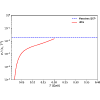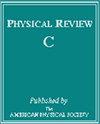Effect of Coriolis force on electrical conductivity tensor for the rotating hadron resonance gas
IF 3.4
2区 物理与天体物理
Q1 Physics and Astronomy
引用次数: 0
Abstract
We have investigated the influence of the Coriolis force on the electrical conductivity of hadronic matter formed in relativistic nuclear collisions, employing the hadron resonance gas model. A rotating matter in the peripheral heavy-ion collisions can be expected from the initial stage of quark matter to late-stage hadronic matter. Present work is focused on rotating hadronic matter, whose medium constituents—hadron resonances—can face a nonzero Coriolis force, which can influence the hadronic flow or conductivity. We estimate this conductivity tensor by using the relativistic Boltzmann transport equation. In the absence of Coriolis force, an isotropic conductivity tensor for hadronic matter is expected. However, our study finds that the presence of Coriolis force can generate an anisotropic conductivity tensor with three main conductivity components—parallel, perpendicular, and Hall—similarly to the effect of Lorentz force at a finite magnetic field. Our study has indicated that a noticeable anisotropy of conductivity tensor can be found within the phenomenological range of angular velocity –0.02 GeV and hadronic scattering radius –2 fm.

科里奥利力对旋转强子共振气体导电张量的影响
我们利用强子共振气体模型研究了科里奥利力对相对论核碰撞中形成的强子物质电导率的影响。在外围重离子碰撞中,从夸克物质的初始阶段到强子物质的晚期阶段,都会出现旋转物质。目前的工作重点是旋转强子物质,其介质成分--强子共振--可能面临非零科里奥利力,这会影响强子流或传导性。我们利用相对论玻尔兹曼输运方程来估算这种传导张量。在没有科里奥利力的情况下,预计强子物质的传导张量是各向同性的。然而,我们的研究发现,科里奥利力的存在会产生各向异性的电导张量,其中有三个主要的电导分量--平行、垂直和霍尔--类似于有限磁场中洛伦兹力的影响。我们的研究表明,在角速度 Ω=0.001-0.02 GeV 和强子散射半径 a=0.2-2 fm 的现象学范围内,可以发现电导张量存在明显的各向异性。
本文章由计算机程序翻译,如有差异,请以英文原文为准。
求助全文
约1分钟内获得全文
求助全文
来源期刊

Physical Review C
物理-物理:核物理
CiteScore
5.70
自引率
35.50%
发文量
0
审稿时长
1-2 weeks
期刊介绍:
Physical Review C (PRC) is a leading journal in theoretical and experimental nuclear physics, publishing more than two-thirds of the research literature in the field.
PRC covers experimental and theoretical results in all aspects of nuclear physics, including:
Nucleon-nucleon interaction, few-body systems
Nuclear structure
Nuclear reactions
Relativistic nuclear collisions
Hadronic physics and QCD
Electroweak interaction, symmetries
Nuclear astrophysics
 求助内容:
求助内容: 应助结果提醒方式:
应助结果提醒方式:


